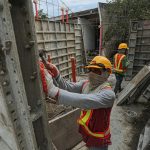Surety Bond Professionals is a family owned and operated bonding agency with over 30 years of experience. With access to a broad range of surety markets, our expert agents are ready to assist with all of your construction bond needs.
The Tesla Gigafactory
Tesla’s existing manufacturing hub in Austin, Texas also serves as the company’s global headquarters. It encompasses 10 million square feet located on 2,5000 acres along the Colorado River. That’s the size of 100 football fields. But plans are in the works to expand what is already an enormous footprint.
Construction of the first of several new buildings started in January 2023, with completion expected in mid-February of 2024. At 693,093 square feet, its cost is estimated at $368 million. Based on Tesla’s most recent filings with the Texas Department of Licensing and Registration, the company’s total investment in its Texas Gigafactory is estimated to reach as high as $750 million.
A Driver of Economic Growth
Tesla tripled the growth of Austin’s workforce in 2022. Building new factories or expanding existing ones drives job creation in the surrounding areas, but not only for those manufacturing companies. Workers and their families need housing as well as goods and services, which gives rise to new businesses, with a corresponding increase in construction.
Elon Musk reportedly owns about 6,000 acres of land in the Austin vicinity and has expressed his intent to build an entire town to provide affordable homes for the employees of his business enterprises in the area. It’s safe to assume that there will be a lot of commercial and residential building going on over the next few years.
With new construction projects underway or on the horizon, new opportunities will be created for contractors—large and small, experienced and emerging. To position themselves to take advantage of those opportunities, contractors need to be able to obtain the necessary construction surety bonds.
What Construction Bonds Do Contractors Need?
Although many states, including Texas, don’t license contractors at the state level, some counties and cities require contractors to obtain local licenses, which typically means they must purchase a local contractor license and permit bond.
Any public works projects undertaken to support a growing community are likely to fall under the state’s “Little Miller Act,” which is modeled on the federal Miller Act. These laws mandate the purchase of certain surety bonds for contractors bidding on or awarded contracts valued in excess of $100,000. Increasingly, private project owners are imposing similar requirements. The most commonly required construction bonds are bid bonds, performance bonds, and payment bonds.
- A bid bond assures the project owner (the bond’s “obligee”) that the contractor will accept the job at the bid price if chosen as the winning bidder. It also is the contractor’s proof of the ability to obtain a performance bond and payment bond.
- A performance bond guarantees that the contractor will complete the job according to the terms of the contract.
- A payment bond is the contractor’s pledge to pay all subcontractors and suppliers as specified in the contract.
Contractors also may be required to furnish the project owner with a maintenance bond, subdivision bond, supply bond, or site improvement bond.
How Do Construction Bonds Work?
Construction bonds protect project owners against financial damages caused by a contractor’s violation of the terms of the surety bond agreement. Each bond forms a legally binding contract between the obligee and two other parties: the contractor (known as the “principal”) and the bond’s guarantor (the “surety”).
The obligee establishes the required bond amount and can file a claim to recover losses caused by the contractor.
The surety guarantees the bond by agreeing to extend credit to the principal to pay a valid claim up to the full amount of the bond.
The surety won’t write out a check to the surety but rather will pay the claimant directly. This is, in effect, a loan to the principal—a loan that must be repaid within a given length of time. Failing to repay that loan can result in the surety taking legal action against the principal to recover the funds.
How Much Do Construction Bonds Cost?
The premium rate is set through an underwriting assessment of the risk to the surety—specifically, the risk of not being repaid for claims paid on the principal’s behalf. The underwriters look closely at the contractor’s financial situation, industry experience, and especially at their creditworthiness. A high personal credit score is a strong sign of low risk to the surety, resulting in a low premium rate. Conversely, a contractor with poor credit is at a higher risk and will pay a higher interest rate.
Building Bonding Capacity
The more qualified a contractor is, the more willing a surety will be to guarantee a high dollar amount in surety bonds. The greater a contractor’s bonding capacity, the larger the projects they are able to get bonded for and the more projects they can undertake at one time.
Call Us Today
Our surety bond professionals will help you grow your revenue by maximizing your surety capacity. Call us today!





